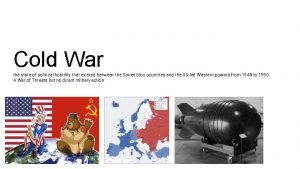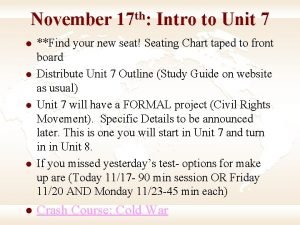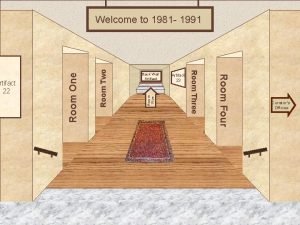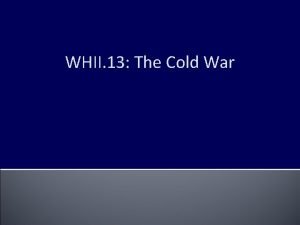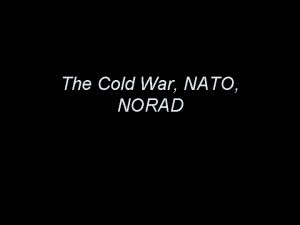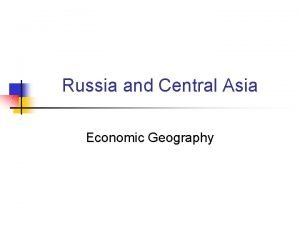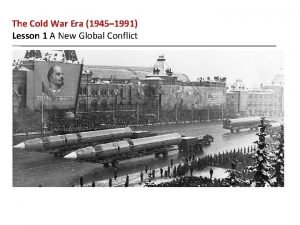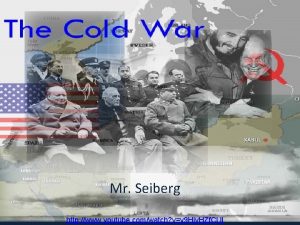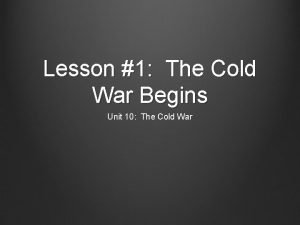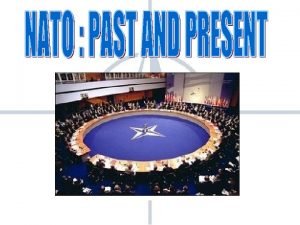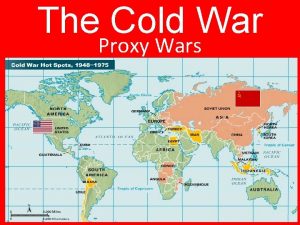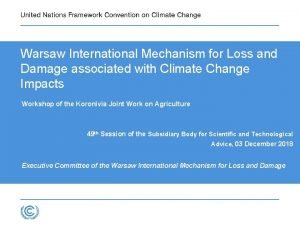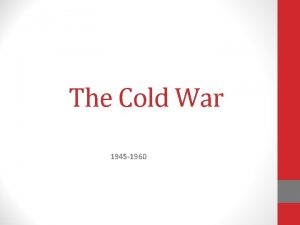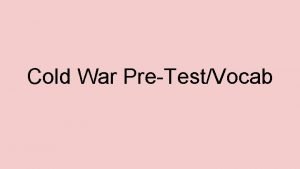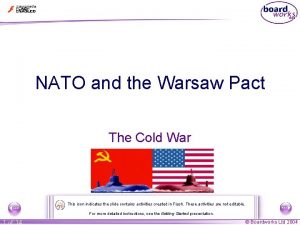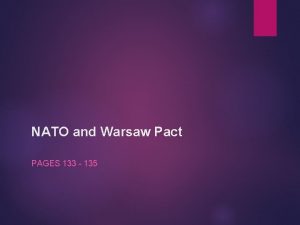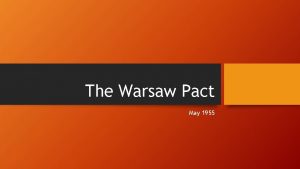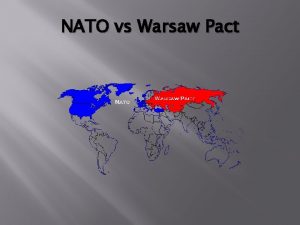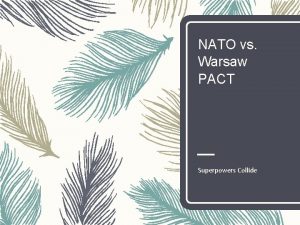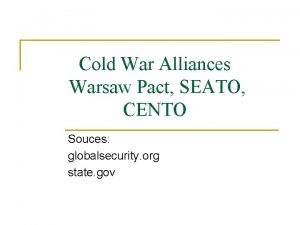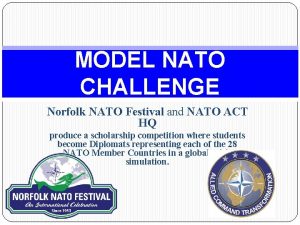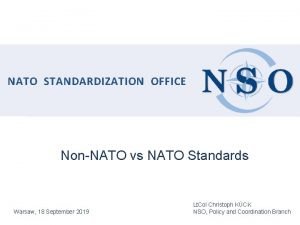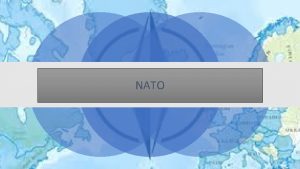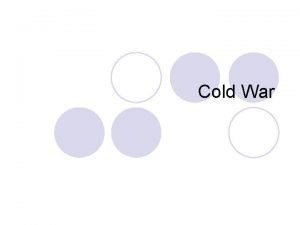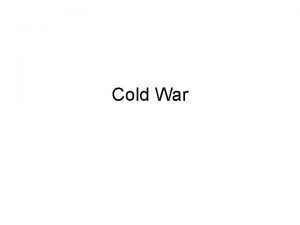NATO and the Warsaw Pact The Cold War














- Slides: 14

NATO and the Warsaw Pact The Cold War This icon indicates the slide contains activities created in Flash. These activities are not editable. For more detailed instructions, see the Getting Started presentation. 1 of 14 © Boardworks Ltd 2004

What we will learn today: 1. What NATO was. 2. Why NATO was set up. 3. How the USSR responded. 4. The importance of NATO and the Warsaw Pact. 2 of 14 © Boardworks Ltd 2004

What was NATO and why was it set up? By the end of the 1940 s, many Westerners were beginning to worry about the large armies which Russia had stationed in Eastern Europe. How could the Berlin Blockade be considered ‘proof’ that the USSR was a danger to Western Europe? 3 of 14 © Boardworks Ltd 2004

The USA used this fear to set up an alliance to defend the Western world. It was called the North Atlantic Treaty Organization (NATO), and countries signed up in April 1949. 12 countries originally signed the treaty. US officials called NATO an “antidote to fear”. How do you think the USSR perceived it? 4 of 14 © Boardworks Ltd 2004

Impact on the Arms Race The USA and the USSR competed to build more and more powerful weapons. This was called the Arms Race, and it is closely linked to NATO and the Warsaw Pact. Each side tried to become more powerful than the other. The USA claimed NATO was a defensive alliance against the USSR. However, when NATO was first set up, the USA had a nuclear monopoly on the world. The USSR did not even test nuclear weapons until later that year. By then, the USA was working on even more powerful versions! Why do you think the USA really was so keen on NATO? 5 of 14 © Boardworks Ltd 2004

The reaction of the USSR In May 1955, West Germany was admitted into NATO. Worst fears realized – Germany being rebuilt and now part of a military alliance! How do you think the USSR felt about this? What was the real purpose of NATO? Could it be offensive? 6 of 14 Action is needed – what can the USSR do to counter NATO? © Boardworks Ltd 2004

Creation of the Warsaw Pact West Germany joining NATO now meant that Germany once again had military power. For the Soviets, who had suffered greatly at the hands of the Germans, this was too much. The Soviets set up the Warsaw Pact which the Eastern European countries signed. It was intended to be a defensive alliance, like NATO, but it was essentially used to keep control in Eastern Europe. Why do you think the USSR set up the Warsaw Pact? 7 of 14 © Boardworks Ltd 2004

Why was the Warsaw Pact created? Match the reasons and the explanations. On the next slide you can prioritize the reasons. 8 of 14 © Boardworks Ltd 2004

Why was the Warsaw Pact created? Now put the reasons in order of importance. 9 of 14 © Boardworks Ltd 2004

Membership of NATO and the Warsaw Pact 10 of 14 © Boardworks Ltd 2004

The Hungarian Uprising In Hungary in 1956 the communist government installed by the Soviet Union was overthrown by the Hungarian people. The new leader announced democratic reforms, and said Hungary would leave the Warsaw Pact. The USSR brutally put down the revolt, rolling into Budapest with tanks and reinstating the communist government. It didn't want to lose one of its buffer states to capitalism. Many thousands of people were killed in the uprising, and many people in the West turned away from support of the USSR. 11 of 14 © Boardworks Ltd 2004

Which was the stronger organization? NATO Warsaw Pact NATO had territory Moscow had political separated by water and domination over central and land (non-NATO countries Eastern Europe. e. g. Switzerland). The Warsaw Pact countries NATO was a voluntary had geographic cohesion alliance of democratic (was one large area) and states. land connections, so it was USA was a major part of easy to transfer forces and NATO, but each member weapons. was involved in decision The Warsaw Pact very making. clearly controlled from NATO had overall military Moscow. superiority. Which organization do you think has greater power? Why? 12 of 14 © Boardworks Ltd 2004

A comparison of the two treaties “…the Parties … will maintain and develop their individual and collective capacity to resist armed attack. ” “The Parties agree that an armed attack against one … of them … shall be considered an attack against them all. ” “…the best way to ensure peace and prevent new aggression … is the organization of a system of collective security … new measures [are required] for strengthening the defences of our peace-loving countries. The treaty of friendship, cooperation and mutual aid … is precisely to serve these aims. ” From the NATO Treaty, 1949. From the Warsaw Pact, 1955. What do the two treaties have in common? Is one more aggressive than the other? Which treaty suggests more control? Why? 13 of 14 © Boardworks Ltd 2004

How important were NATO & the Warsaw Pact? Discuss your ideas together… What do you think? Were these defensive alliances really needed? What impact did the creation of NATO have on Remember the USSR? Berlin Blockade? 14 of 14 In your opinion, who had most to gain from these alliances? © Boardworks Ltd 2004
 Satellite states cold war
Satellite states cold war Nato warsaw pact
Nato warsaw pact Tussia
Tussia Warsaw pact countries
Warsaw pact countries Warsaw pact countries
Warsaw pact countries Warsaw pact countries
Warsaw pact countries Warsaw pact countries map
Warsaw pact countries map Lesson 1 a new global conflict
Lesson 1 a new global conflict Sshttps://www.youtube.com/watch?v=ob49ergnovs
Sshttps://www.youtube.com/watch?v=ob49ergnovs The cold war begins lesson 1
The cold war begins lesson 1 Nato stands for
Nato stands for Proxy wars
Proxy wars Warsaw international mechanism
Warsaw international mechanism Cold war cause and effects
Cold war cause and effects Pretest communism and the cold war
Pretest communism and the cold war
